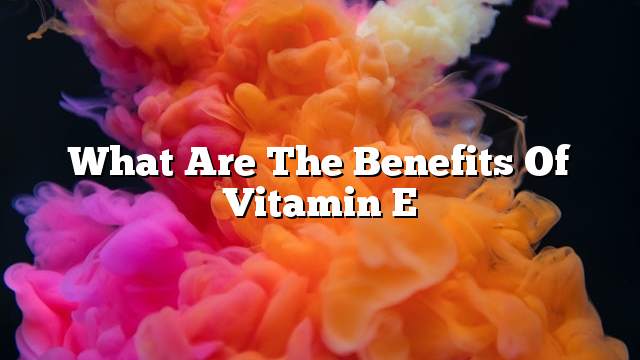The human body needs many nutrients to grow healthy and healthy. And our interest in getting our bodies on the nutrients that need to eat the diet of the right food, we are on the right path, and these important nutrients vitamin E. What is this vitamin? What causes the deficiency of the body? Where is there? This is what we will learn in this article.
Vitamin E
Vitamin E or vitamin E is a type of fat-soluble vitamin that has been discovered as a necessary ingredient for reproduction in test rats. It is called tocopherol, a major antioxidant in the body, and one of its key mechanics in fighting free radicals , Protecting the body from the harmful effects of active oxygen compounds that consist of metabolic processes, or which the body is exposed to from the environment , Thus protecting the sensitive parts of cells and their membranes from damage. Vitamin E works mainly in the protection of polyunsaturated fatty acids from oxidation, but also protects other lipids, such as vitamin A .
Benefits of Vitamin E in the body
As mentioned above, the main function of vitamin E is to act as an antioxidant that protects the body from free radicals and active oxygen compounds. It is considered to be the most important antioxidant in lipid found in the cells of the body. It is present in the fatty part of cell membranes, Of oxidation and damage resulting from it, by converting free radicals into harmless products by giving them hydrogen atoms. Vitamin E is part of a complete system to protect cells from the effects of oxidation, which includes many enzymes and some other essential nutrients, which can affect their levels on the work of this vitamin .
The vitamin E function as an antioxidant is important for other nutrients in protecting the body from diseases and health conditions related to oxidation, including aging, arthritis, cancer, cardiovascular disease, cataract, diabetes, Infections and infections, and some cases of Alzheimer’s disease .
Many scientific studies support these roles for vitamin E. Studies have shown that it reduces the risk of cardiovascular disease by protecting LDL from oxidation, which is a key factor in these diseases. .
Despite these roles of vitamin E, scientific research has been directed to study the effect of dietary supplements on the reduction of many chronic diseases, such as cardiovascular disease, aging, etc. But most of the results of these studies have not found that taking additional doses of this vitamin reduces Of the risk of infection , But vitamin E has a response in two cases, the first is fibrostic breast disease, and the second is intermittent claudication, .
Daily needs of vitamin E
| Age group | Daily needs (alpha-tocopherol mg / day) | Upper limit (mg / day) |
|---|---|---|
| Infants 0-6 months | 4 | undefined |
| Infants 6-12 months | 5 | undefined |
| Children 1-3 years | 6 | 200 |
| Children 4-8 years | 7 | 300 |
| Children 9-13 years old | 11 | 600 |
| 14-18 years old | 15 | 800 |
| 19 years and over | 15 | 1000 |
| The pregnant woman is less than 18 years old | 15 | 800 |
| Pregnant 19-50 years old | 15 | 1000 |
| Lactation is less than 18 years | 19 | 800 |
| Breastfeeding 19-50 years | 19 | 1000 |
Sources of vitamin E food
Vitamin E is widely found in foods, and the majority of the vitamin intake in the diet is derived from vegetable oils and products containing or made from them, such as margarine and salad sauce. Wheat germ oil is distinguished by its vitamin E content, Foods that have only been subjected to simple manufacturing and cooking processes to obtain it, because it is rapidly damaged by oxidation and heat .
Vitamin E deficiency
It is rare to have a vitamin E deficiency due to lack of dietary intake, but it is usually associated with diseases that impede fat absorption, such as cystic fibrosis. The deficiency of this vitamin causes degeneration of red blood cells, which causes hemolytic anemia. This type of anemia can appear in children born early. Before the vitamin E is transferred from the mother’s body to the child’s body, which occurs in the last weeks of pregnancy, This type of anemia is treated to compensate for the deficiency of this vitamin .
Chronic vitamin E deficiency causes muscle neuromuscular dysfunction, including muscle weakness, loss of deep tendon reflexes, , Loss of muscle balance, impaired vision and speech ability, and these symptoms can be treated by vitamin E .
Vitamin E poisoning
Vitamin E is one of the least toxic , And it is rarely poisoned even with the increase in the prevalence of the use of food supplements in recent years, because of the high maximum allowable daily intake of about 65 times its daily needs in adults, and if the intake of large amounts of it may interfere with the work of vitamin K in blood clotting, It may also increase the effect of anticoagulant drugs, causing an increase in the volume and increase the risk of bleeding, and remains symptoms of toxicity much less than those obtained by poisoning of vitamin A or vitamin D .
